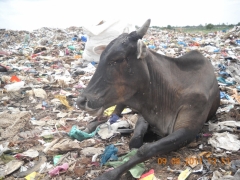 |
| Though sacred, many of India loved cows are living and dying off plastic filled dumps. The Plastic Cow Project |
The Killing Fields: The High Cost of Convenience
With so much discussion of how aquatic life is in peril due to the global issue of plastic pollution amongst our oceans, many overlook the problems this convent polymer has on our land animals. Until viewing "Battle of the Bag" I was unaware of the problems India is facing with their excessive waste and attempts to deal with the issue to help create a healthier state.
The sacred cow of India is free to roam as it wishes, often without the fear of experiencing any direct harm from the mostly Hindu population. This freedom possibly comes at a dangerous cost. If the animals were corralled or kept in open fields they might not be as exposed to India's land pollution. The cows are free to scavenge for their food, often finding buffet type spreads in the open dumps. Though the dumps may offer food, many cows end up swallowing many kilos of plastic waste. According to the documentary, this leads to gastrointestinal blockage and eventual malnutrition. Unfortunately little is being done to remedy the tons of waste already in these dumps, but India is trying to solve the issue with their plastic task force, and more effectively with "The Plastic Cow Project." The project provides helps to provide surgery for cows who have swallowed large amounts of plastic. They also assist with legal matters having to do with legislation surrounding the use of plastic in India. While the plastic cow project is helping it seems the task force set to limit bags are not faring as well. According to a 2014 article in The Indian Express,"The ban on plastic has proved a dud." This reality is disconcerting because it states that not only few care about how this effects other species, but also it suggests that many who take part in the littering have little other option and are unaware of the health issues this creates for humans worldwide.
The makers of plastic bags might contend that we are not using the bags to their potential and that humans are creating the waste. There is definitely some merit to the fact that humans have become too disposable with the majority of their consumables, this is one of the major contributor to this pandemic. To take the word of the manufacturer of plastic bags as something to be 100 percent trusted might be naive. Plastics are part of the petroleum industry, and industry that continuously has damaged the earth with little repercussions. Whether it the Exxon Valdez, the BP spill, or the issue with these bags, an executive always can explain away the problem. In order to properly deal with the pollution from plastic the world must create a solution together, a way to be responsible for the local environment while keeping sight of how each ecosystem is affected by the next. A simple ban on plastic, or a specialized task force is not the answer. The answer begins with a little compassion.
No comments:
Post a Comment